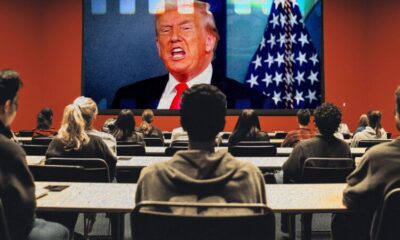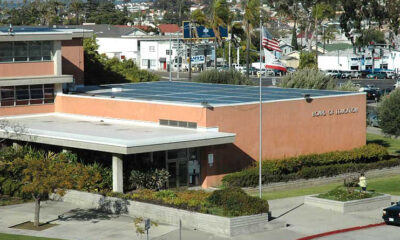Science
Trump Criticizes Universities as Scientists Win Six Nobel Prizes

In a remarkable achievement for American academia, six scientists affiliated with U.S. universities were awarded Nobel Prizes within three days. This significant recognition highlights the vital role that public universities play in advancing scientific discovery and innovation. Notably, five of the laureates have ties to California’s prestigious higher education system, underscoring the state’s influence in global research.
President Donald Trump has recently intensified his criticism of both public and private universities, arguing that they undermine values such as free speech and contribute to incidents of student misconduct, including antisemitism. His comments came in the wake of these Nobel recognitions, prompting discussions about the impact of his rhetoric on institutions that are often seen as the backbone of American intellectual and cultural progress.
University Contributions and Presidential Critique
The recent Nobel Prize winners represent a diverse array of scientific disciplines, emphasizing the contributions that U.S. universities make to global knowledge. The achievements of these scholars serve as a reminder of the importance of fostering academic environments where innovation can thrive.
Trump’s focus on universities has sparked debate over the balance between maintaining free speech and addressing the complexities of campus culture. He has pointed to instances where student activism has escalated into actions he perceives as harmful or divisive. While he acknowledges the need for free expression, he argues that universities must actively prevent behaviors that could lead to hate speech or discrimination.
Critics of Trump’s stance argue that his approach could stifle academic freedom and discourage open dialogue on campuses. They contend that universities should be spaces where diverse opinions are exchanged, rather than arenas for ideological battles. The debate surrounding these issues continues to evolve, particularly in light of the recent accolades awarded to scientists who exemplify the potential of academic collaboration and inquiry.
The Role of Universities in Shaping Society
Public universities have long been viewed as engines of societal advancement, contributing not only to scientific progress but also to the workforce and local economies. The recent Nobel Prizes serve as a testament to this vital role, reaffirming the significance of investment in higher education.
According to data from the National Science Foundation, U.S. institutions receive substantial federal funding for research, which supports innovation across various fields. This financial backing is critical for maintaining the competitiveness of American universities on the global stage.
The impact of Trump’s administration on higher education policies remains to be seen, but his statements have initiated a larger conversation about the future of academic institutions in the U.S. As the nation grapples with complex social issues, the challenge will be to nurture environments that promote both free speech and mutual respect among diverse student populations.
As the world observes these developments, the achievements of the recent Nobel laureates remind us of the enduring value of education and research. The ongoing dialogue surrounding university policies and practices will undoubtedly influence the landscape of American higher education for years to come.
-

 Science1 month ago
Science1 month agoNostradamus’ 2026 Predictions: Star Death and Dark Events Loom
-

 Technology2 months ago
Technology2 months agoOpenAI to Implement Age Verification for ChatGPT by December 2025
-

 Technology7 months ago
Technology7 months agoDiscover the Top 10 Calorie Counting Apps of 2025
-

 Health5 months ago
Health5 months agoBella Hadid Shares Health Update After Treatment for Lyme Disease
-

 Health5 months ago
Health5 months agoAnalysts Project Stronger Growth for Apple’s iPhone 17 Lineup
-

 Technology5 months ago
Technology5 months agoElectric Moto Influencer Surronster Arrested in Tijuana
-

 Education5 months ago
Education5 months agoHarvard Secures Court Victory Over Federal Funding Cuts
-

 Health5 months ago
Health5 months agoErin Bates Shares Recovery Update Following Sepsis Complications
-

 Technology6 months ago
Technology6 months agoDiscover How to Reverse Image Search Using ChatGPT Effortlessly
-

 Technology7 months ago
Technology7 months agoMeta Initiates $60B AI Data Center Expansion, Starting in Ohio
-

 Science4 months ago
Science4 months agoStarship V3 Set for 2026 Launch After Successful Final Test of Version 2
-

 Technology7 months ago
Technology7 months agoRecovering a Suspended TikTok Account: A Step-by-Step Guide




















